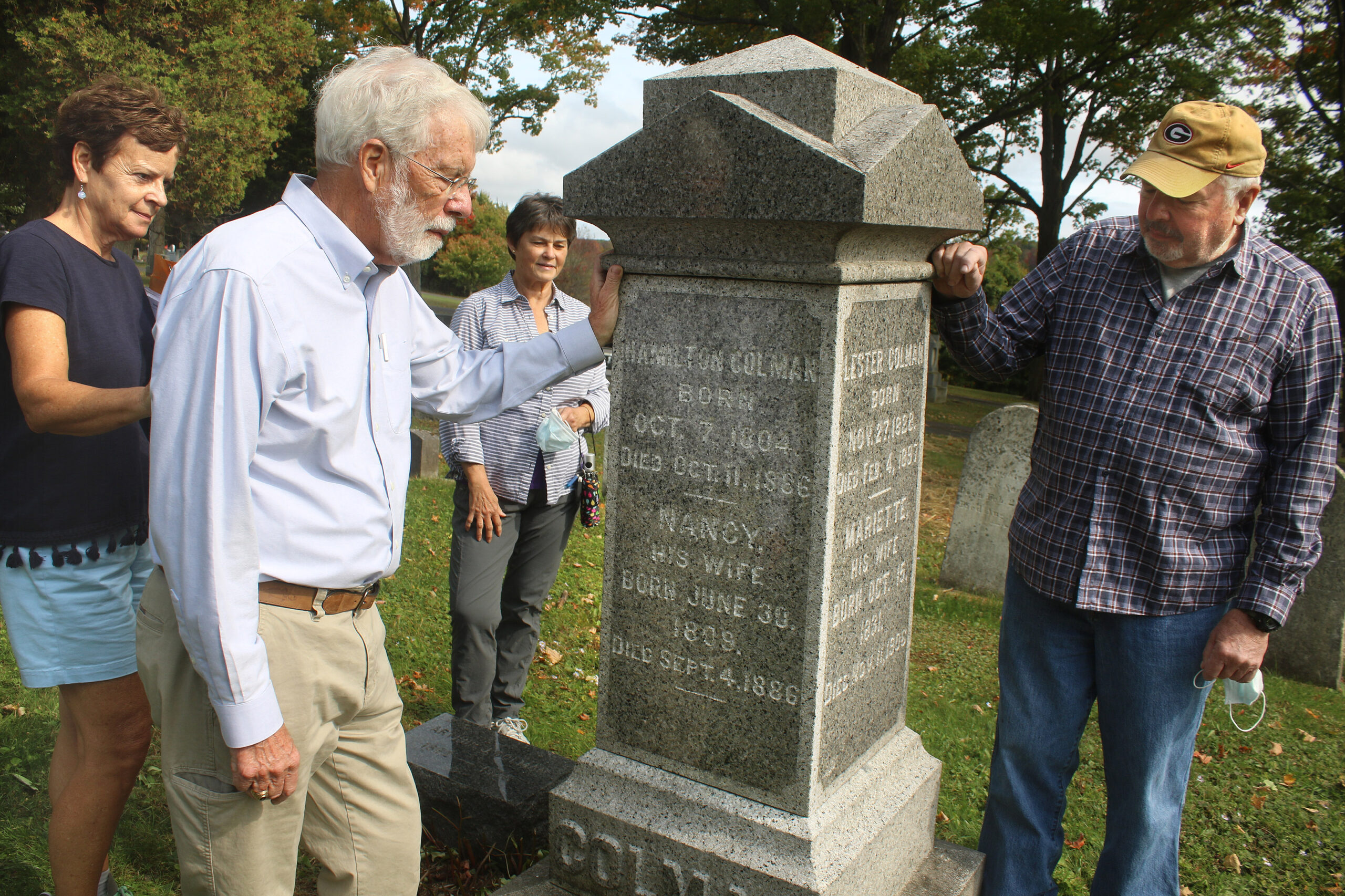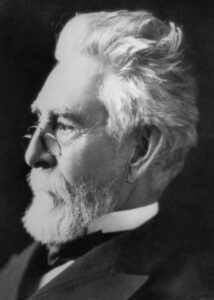Colman’s Spirit Of Service
Lives On In Otsego County
Name Rare Locally, But Relatives
Of First USDA Secretary Plentiful

Colman family marker in Richfield Springs’ Lakeview Cemetery. (Jim Kevlin/AllOTSEGO.com)
By JIM KEVLIN • Special to www.AllOTSEGO.com
RICHFIELD SPRINGS – There may be no “Colmans” around here, but there’s plenty of Colman kin: Burches, Osterhoudts, Ainslies and Blisses, among others.

“It’s an honor to have somebody at that level in our government related to me,” said Orlo C. Burch Jr. of Hartwick, who called after reading last week’s article about a historical marker being erected Nov. 1 in Greenville, Ind., in honor of Norman J. Colman, the first U.S. secretary of agricultural and a Richfield Springs native.
In various articles that have appeared over the years, and in the Wikipedia entry, Norman is referred to as both “Colman” and “Coleman,” and it was noted that there are plenty of “Colemans” in Otsego County today, but few “Colmans.”
Yes – and no, said Orlo Burch.
Burch’s grandmother, Grace, married a Conover, but she was the daughter of Arthur J. Colman, born in 1862, and granddaughter of Lester M. Colman, born in 1828, who was the great Norman’s brother, according to a family tree assembled by Orlo’s wife Cindy.
And what a tree. It shows family connections to the Ainslies of Ainslie Road, Town of Richfield, and the late Homer Osterhoudt, a mason on Baseball Hall of Fame construction in the 1930s, who then attended all Inductions but three before his death in 2018.
That same Arthur Colman, Orlo’s great-grandfather and Norman’s nephew, married a Jeanette Bliss, thus connecting the famous man to David Bliss, who, as current chairman of the Otsego County Board of Representatives, is the highest ranking in-county elected official.
The first Colman in Otsego County was a Samuel Colman, born in Massachusetts in 1768. He moved to Connecticut, married an Abigail Dole (in the Newtown area), and in the 1780s loaded up an oxcart and headed to Otsego County. The couple built a log cabin in the neighborhood of Allen’s Lake.
Samuel’s son Hamilton, Norman’s father, worked on the family farm. Born in 1804, Hamilton had two sons, the famous Norman and Lester, and two daughters, Sophie (who married John Fake) and Cornelia “Harriet”, (who married a Catlin.)
Even back then, the family had some stature: Hamilton was county commissioner of deeds in the 1830s, and served several years at Richfield town supervisor in the 1850s.
By then, Norman, born in 1827, had long departed for the Midwest, obtaining a law degree in 1850 in St. Louis and joining the Floyd County (Ind.) Seminary in Greenville, Ind., the following year.
Norman returned to St. Louis, practiced law, served in the Civil War, founded the Colman’s Rural World newspaper, whose support of Land Grant Colleges and, in particularly, Agricultural Field Stations, caused President Grover Cleveland to name him U.S. agricultural commissioner in 1885.
In 1889, the commission was elevated to cabinet status, and Colman served as first U.S. Department of Agriculture commissioner for three weeks before Benjamin Harrison succeeded Cleveland.
It’s a bit of a mystery why Norman left home, but Orlo’s brother David, also of Hartwick, isn’t surprised at all. “A lot of people were moving about then,” he said, as the Midwest opened to settlers in the decades before the Civil War.
The impetus for public service remains strong in the Burch family. Orlo and David’s father, Orlo Sr., was president of the Hartwick school board before it was absorbed into the Cooperstown Central District.
Orlo Jr. ran for Otsego town supervisor in the aughts, losing to Meg Kiernan, who then appointed him to the town board to fill out a one-year vacancy. (He jokes that he lost by 11 votes, and had 11 “Burch for Town Supervisor” pens left over. If only he had handed them out.)
Plus, the Burch brothers’ sister, Carole Donahue, who passed away in 2012, was Hartwick town supervisor for 18 years in the 1980s and 1990s.
“I’ve always had a sense you need to do volunteer work with organizations and community groups,” said Orlo Jr. “You have a community responsibility. Somebody has to do it.”
While researching family history can be elevating, there can be tragedies, too. For instance, Norman’s nephew, Norman J. Fake, “a most excellent and most promising young man” and an Agriculture Commission chemist while his uncle was commissioner, drowned in the Potomac River at age 20.
On a more positive note, one of Norman Colman’s daughters was the State of Maine’s First Lady.
The Burch family is also related to Antoine Dutot, who fled the slave revolt in Haiti and founded the town of Dutotsburg, Pa., now called Delaware Water Gap. Dutot’s homestead is preserved, and a museum there marks his contribution.
And one of the Liberty ships, designed and built en masse during World War II to quickly replace British cargo ships sunk by German U-boats in the North Atlantic, was commissioned the Norman J. Colman.
He was in good company.
Another Liberty ship, also built by Permanente Metals Corp., Richmond, Calif., was named for William Allen White, editor-publisher of the Emporia, Kansas, Gazette who penned the famous 1896 editorial, “What’s The Matter With Kansas.”

